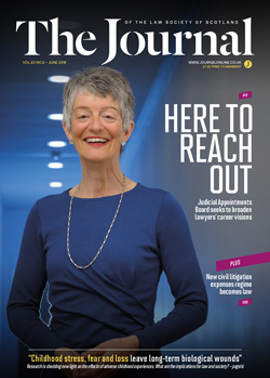AGM does ABS – a reprise
Scottish solicitors will pay an extra £15 for their practising certificate for the year from 1 November 2018, the Law Society of Scotland’s AGM confirmed on 31 May.
Members voted by a majority – including votes previously registered electronically, under a change to the Society’s constitution – to adopt Council’s proposed fee of £565, up from £550, the rate since 2010. The increase was put forward to prevent the Society operating at a deficit.
A meeting in which the only actual debate came at the end, also approved the annual reports and accounts of the Society, the Client Protection Fund and the Scottish Solicitors’ Benevolent Fund; and the appointment of new auditors, following a tender process.
Delivering his President’s address, Graham Matthews said it had been a good year, “and I’m not just saying it”. It had seen a number of firsts: the first admission ceremony outside Edinburgh; the first Lawscot Foundation-sponsored students; the first representative on Council for international members; and the launches of Scottish Legal International, and the Lawscot Wellbeing mental health awareness programme.
“Negatives” included the ongoing budget issues with the SLCC, though he had noted a mood for system change there if legislation could be passed. Progress had still not been made on legal aid; and speaking as one himself, the same issues as ever faced rural practitioners trying to recruit. Should they be more forthcoming about earnings and quality of life, he asked?
Chief executive Lorna Jack reported on progress with the Society’s Leading Legal Excellence strategy, now more than halfway through its five-year programme. We should be proud of what had been achieved so far, she stated, outlining progress across the five themes of assure, serve, excel, influence and grow, with a huge amount of work taking place. She concluded by emphasising the importance of the Society’s equality and diversity work, now to be informed by the new Profile of the Profession survey, which more than 3,000 members had taken by then.
ABS revisited
Under “Topics for discussion” the meeting then heard a plea from Michael Sheridan, representing the Scottish Law Agents Society, for reconsideration of the Society’s support for alternative business structures (ABS). He asked whether opening the market to ABS would accelerate the trend of takeovers by firms south of the border, and whether the Society had a duty to “foster the Scottish legal tradition” and therefore to “wind back” ABS. Further, if the ABS “nightmare” came to pass, and a big company offered money to acquire his practice, should he jump at it or stand up for his principles? Sheridan argued that he “should not be exposed to that temptation”. And he restated his argument that the solicitor’s public duties towards clients and the court were inconsistent with ownership by a company that had to be run in the interests of its shareholders.
Responding, Stephen Gibb, chief executive of Shepherd & Wedderburn, said ABS was not connected with takeovers, and there was no connected motive. Not all big firms were seeking such a merger – his own included – but many saw market pressures to do so. He was “passionate” about the brand of Scottish solicitor and what could be done to preserve its quality; this was about finding the right way to regulate. The reviews of legal aid and legal services regulation both presented serious issues to which the profession had to be ready to respond in a united way.
Former President Christine McLintock reminded the meeting that prior to the 2010 Act, the then Justice Secretary Kenny MacAskill had told the profession the status quo was not an option. For most firms interested in ABS, it was in order to allow such as financial directors to become partners and improve the running of the firm.
Simon Brown asked Sheridan not to portray himself as “a little guy fighting against a man”. High street firms were going to the wall every day and if someone made him an offer for his own firm, he would sell. “And why can’t I let an accountant use my empty floor?”
Sheridan had more indications of support for his call to reintroduce proxy voting as opposed to electronic voting for members unable to be present at meetings, which he justified by saying that a proxy attending a meeting was exposed to the arguments whereas electronic votes had to be cast in advance. Proxy voting was the “minimum standard” of governance.
Some other members present appeared sympathetic to a fresh look at the issue.
In this issue
- Recovery of electronic documents: time for guidance?
- Reasonable treatment options and professional judgment
- Retention demystified?
- Child law: time for change? (1)
- Reading for pleasure
- Opinion: Ayla Iridag
- Book reviews
- Profile: Rachael Delaney
- President's column
- Keeper's update
- People on the move
- Choice answers
- When four ACEs is a bad hand
- Litigation: passing the bill
- Child law: time for change?
- Debt recovery and AI: are we plugged in?
- Technical but important
- Ringing the changes: UK and EU IP developments
- Commercially sensitive? Justify that
- Abandonment: whose use counts?
- Retroactive TUEs and the Nasri case
- Clarifying real burden enforcement rights
- How we deal with leases at termination
- In-house and in the know
- Public policy highlights
- Meet Laura
- Complaints: from "bonkers" to benefit?
- That time of year again
- AGM does ABS – a reprise
- Paralegal pointers
- Finance for dummies (and lawyers)
- Ask Ash






